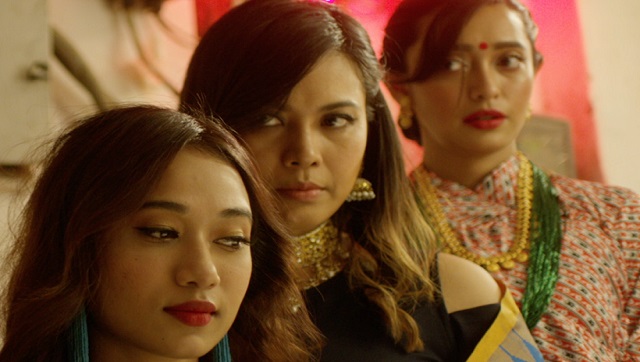Language: Hindi, English There is a scene in filmmaker Nicholas Kharkongor’s Delhi-set film Axone where a Northeastern man shoves a Delhi boy who is pestering him, and screams, “Get away, you f*cking Indian!” It is followed by silence, and subsequently, the Delhi boy Shiv (Rohan Joshi) asks another Northeastern man, “Tum log apne aap ko Indians nahi samajhte kya?” (Don’t you guys consider yourselves Indians?). It is one of the most effective scenes of Axone, a film that revolves around a bunch of friends from the Northeast, struggling to prepare the traditional Naga dish of pork with axone (pronounced akhuni), a fermented soyabean condiment, as a surprise gift for another friend getting married the same evening. But they must do so in stealth mode as they cannot afford to invite the ire of their Jat landlord (Dolly Ahluwalia) and other North Indian neighbours, with the strong smell. [caption id=“attachment_8465361” align=“alignnone” width=“825”]  Sayani Gupta in a still from Axone[/caption] This makes for a fertile ground for a compelling satire, a refreshing thriller or a delectable food film. But Kharkongor treats it like a slice-of-life film in his attempt to incorporate all the above mentioned elements. The ingredients may be of varying kinds but do they come together to make a sumptuous serving? If the opening minutes of the film are to go by, cinematographer Parasher Baruah’s tracking shots and Suresh Pai’s measured editing make Axone seem like an intriguing thriller. Three Northeastern friends, Upasana (Sayani Gupta), Chanbi (Lin Laishram), and Zorem (Tenzin Dalha), are seen stealthily stepping fetching chunks of pork and the axone (guarded inside an airtight container). Their baleful expressions and muted steps give one the idea that Axone could be an interesting concoction of satire and thriller. But that proves to be only a whiff since those ingredients are diluted by yet another prospect of Axone being an unconventional food film. There are enticing close-up shots of pork getting chopped and the stew getting brewed, set against Tajdar Junaid’s striking background score marinated in ethnicity. But even that possibility gets thrown out of the window when the plot runs out of gas. It does not seem like Kharkongor wants to surprise the audience by challenging their notions of what genre the film falls under or which direction it wants to head into. Instead, he makes it clear quite early on that it is a slice-of-life drama, and adds teaspoons of comedy, satire, thriller, food, friendship, and romance to it.
In the hands of a more able cook, all these ingredients could have made for an inviting le déjeuner, but the proportions go a little awry here.
Besides the unique premise, the film has little to offer in terms of novelty. The micro-conflicts that each member of the close-knit community faces include something as run-of-the-mill as a love triangle. But where Kharkongor regains the grip over the narrative is when he packs in social commentary on the state of Northeastern immigrants in Humayunpur, Delhi, which the North Indian landlords insensitively refer to as “Bangkok street” because of the community stronghold. Having spent several years in the same area, Kharkongor narrates a first-hand experience by detailing the struggles of the Northeastern migrant community in Delhi. Several instances of discrimination against them are widely reported, yet Kharkongor makes one fume even more with how the insecure native population levels various veiled attacks at the community. These include derogatory slang like “malai”, and thoughtless statements like, “Iski toh aankhien bhi nahi khuli” (he can’t even open his eyes) and “Sab ek jaise hi toh lagte ho aap” (you all look the same). Axone literally stands for ax (smell) + one (strong). As the primary premise suggests, smell has been used as a metaphor for the intangible repulsion towards the Northeastern community. The tilting glances of the building from the inside and the close-up shots of the exhaust fans propel the idea further. The fact that Kharkongor is well-versed with the narrow, winding bylanes of the area is reflected by long shots, that lend the frame a sense of claustrophobia and alienation. But Kharkongor does not reserve all of his potshots for only the native population. As the opening paragraph suggests, he also slides in a message to the migrant population that they must own their lives, including their identity, nationality, ethnicity, and self-esteem. Bendang’s (Lanuakum Ao) track is the most urgent in the narrative. In his introduction scene, he is seen strumming his guitar and cramming the lyrics of ‘Uthe Sab Ke Kadam’, a Hindi song from Basu Chatterjee’s 1979 film Baton Baton Mein. When he fails to pick up the lyrics, he cannot help but express his frustration. Later in the film, his frustration is attributed to a past encounter with a violent, racist mob. How he bounces back in the end makes for a heartening story, and the director could have given highlighted his graph more prominently. Kudos to casting directors Sanjeev Maurya and Dilip Shankar for assembling a talented pool of Northeastern actors who make the world of Axone even more real from what it already is courtesy Kharkongor’s vision and Barua’s lensing. The only actor who plays a Northeastern migrant but is not one in real life is Sayani Gupta. As she has proven several times in her impressive career, she can smoothly slip into the skin of a character with any background. [caption id=“attachment_8465371” align=“alignnone” width=“825”]  A still from Axone[/caption] She seems to have worked hard on her accent, and the effort pays off. But in some bits, her manner of speaking does feel rehearsed and repetitive. Though that is a minor quibble, the casting directors could have also considered a Northeastern, who does not resemble one physically, for her part. That could have made Upasana both interesting and convincing. Dolly Ahluwalia and Vinay Pathak play extensions of the several boisterous, cranky North Indians they have played in the past. In fact, Dolly just seems a more irritable version of her Vicky Donor character. Adil Hussain chimes in a cameo as a Jat patriarch perennially seated outside Hironya’s shop. He does not have any dialog but nails his expression of a curiously suspicious watchdog. One does not mind his minor presence in the film because he aptly represents the prying eyes of the native population, fixated on every activity of the migrants. Despite the presence of comic stalwarts like Pathak and Ahluwalia, the only actor who manages to crack you up is Rohan Joshi as Shiv. He plays a pesky but well-mannered Dilli ka launda, who cannot rise above his inherent bias towards the Northeastern community around him despite being friends with them. When he asks for an affair with a Northeastern girl to gain cultural capital, you sigh loudly. But when he claims he missed the India vs Sri Lanka cricket match for their wedding, you cannot help but guffaw. Joshi is also the only actor Kharkongor reunites with from his debut Hindi film Mantra. Though the director was more in control of his craft in the Rajat Kapoor-starrer, he makes the follow-up in Axone feel more lived-in. While raising their concerns as a conscientious representative, he also paints their world in ambitious colours. The visuals towards the end of the film, where the cast walks with pride, asserting their traditional Northeastern attires and sense of belonging against the crude aesthetic of a Dilli ki gali, will always be a sniff away. Axone is streaming on Netflix. Rating: ***
All images from Twitter.


)
)
)
)
)
)
)
)
)



